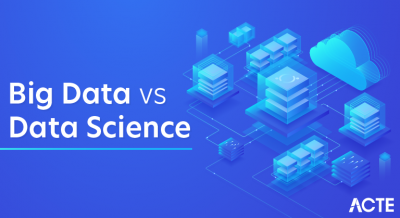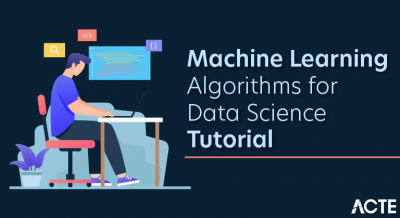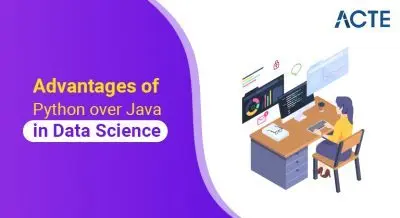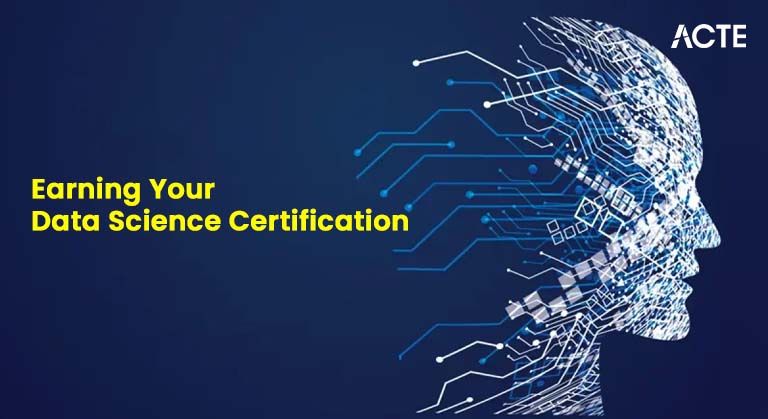
- What is a Data Science Certification?
- Top Global Certification Programs
- Eligibility and Prerequisites
- Skills Gained Through Certification
- Syllabus Overview
- Certification vs Degree: Which is Better?
- Online vs Offline Certification
- Job Opportunities After Certification
What is a Data Science Certification?
A data science certification is a formal credential awarded to individuals who demonstrate proficiency in the core concepts, tools, and techniques essential to the field of data science. These certifications validate a candidate’s skills in areas such as data analysis, statistical methods, programming languages like Python or R, machine learning algorithms, and data visualization. In today’s fast-paced, data-driven world, earning a recognized certification not only boosts a professional’s credibility but also enhances their career opportunities by providing tangible evidence of their expertise to employers and clients. Data science certifications are offered by a variety of institutions including universities, online learning platforms, professional organizations, and leading technology companies, often as part of comprehensive Data Science Training programs. They cater to a wide range of skill levels from beginners who are just entering the field to experienced professionals looking to deepen their knowledge or specialize in specific areas. Many certifications focus on niche domains such as artificial intelligence, big data analytics, or advanced machine learning, allowing learners to tailor their education to their career goals. These programs typically include hands-on projects, exams, and practical assessments, ensuring that certified individuals possess not only theoretical knowledge but also real-world problem-solving skills. By completing a certification, data scientists can stay current with industry trends, improve their technical abilities, and gain a competitive edge in a crowded job market. Overall, data science certifications are valuable tools for continuous learning and professional development in an evolving technological landscape.
Do You Want to Learn More About Data Science? Get Info From Our Data Science Course Training Today!
Top Global Certification Programs
Numerous prestigious institutions and organizations offer globally recognized data science certifications that have become benchmarks for proficiency and expertise in the field. Among the most sought-after programs is the IBM Data Science Professional Certificate available on Coursera, which provides a comprehensive introduction to data science concepts and practical skills. Microsoft offers the Certified: Azure Data Scientist Associate certification, focusing on applying data science techniques within the Azure cloud ecosystem. Google’s Professional Data Engineer certification emphasizes designing and building scalable data processing systems, a responsibility often encountered A Day in the Life of a Data Scientist. Other notable certifications include the Cloudera Certified Associate (CCA) Data Analyst, which validates skills in data analysis and SQL on big data platforms, and the SAS Certified Data Scientist credential, designed for professionals working with advanced analytics using SAS tools. The Certified Analytics Professional (CAP) certification is a vendor-neutral credential that demonstrates broad analytics expertise applicable across industries. Academic programs like HarvardX’s Data Science Professional Certificate, available through edX, combine rigorous coursework with real-world projects. The Data Science Council of America (DASCA) offers certifications tailored to different experience levels, while Udacity’s Data Scientist Nanodegree focuses on hands-on learning through projects. INFORMS also provides the Certified Analytics Professional credential, widely respected in the analytics community.
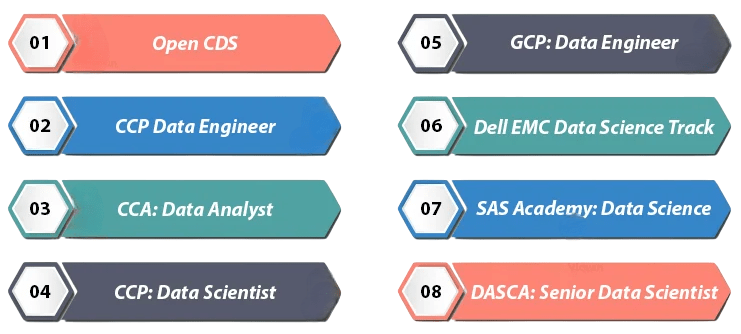
Each program varies in scope, depth, prerequisites, and delivery format, so candidates should carefully evaluate their career goals, existing skills, and preferred learning style when choosing the right certification. By selecting an appropriate certification, data professionals can validate their skills, enhance their resumes, and gain a competitive advantage in the rapidly evolving data science landscape.
Eligibility and Prerequisites
- Educational Background: Most data science certification programs recommend or require a bachelor’s degree, typically in computer science, statistics, mathematics, engineering, or a related technical discipline. This foundational education supports understanding complex data concepts.
- Mathematical and Statistical Knowledge: A basic grasp of mathematics and statistics is essential. Concepts like probability, linear algebra, calculus, and statistical inference are often covered in certification courses and used in real-world data analysis.
- Programming Skills: Familiarity with at least one programming language commonly Python or R is a key requirement. These languages are widely used in data science for data manipulation, analysis, and building machine learning models.
- Understanding of Databases: Knowledge of relational databases and the ability to query data using SQL is often expected. Many programs assume candidates can extract, manipulate, and interpret data from different storage systems, a skill supported by proficiency in Top Data Science Programming Languages.
- Analytical or Work Experience (Optional): Some intermediate or advanced certifications may require previous experience in analytics, software development, business intelligence, or a related field. This experience helps contextualize the certification content.
- Eligibility for Beginners: Many entry-level certifications are designed to be accessible to recent graduates or career changers. While prior experience is beneficial, a strong interest and foundational knowledge in data and coding can be enough to qualify.
- Program-Specific Requirements: Different institutions have unique criteria depending on course depth and focus. It’s important to review specific certification prerequisites to ensure you meet the minimum qualifications before enrolling.
- Data Analysis and Interpretation: Certifications train learners to explore, clean, and analyze datasets effectively. You gain the ability to identify trends, patterns, and anomalies that support data-driven decision-making.
- Statistical Thinking: A strong understanding of statistics is developed through certification programs. Skills include probability theory, hypothesis testing, regression analysis, and the ability to apply statistical methods to real-world data.
- Programming Proficiency: You’ll gain hands-on experience in languages like Python or R, including writing scripts, handling data structures, and using libraries like Pandas, NumPy, and Scikit-learn for analysis and modeling, all essential components of Data Science Training.
- Machine Learning Knowledge: Most certifications cover the fundamentals of machine learning, including supervised and unsupervised learning, model training and evaluation, and selecting appropriate algorithms for different problems.
- Data Visualization: Participants learn how to create meaningful visualizations using tools like Matplotlib, Seaborn, or Tableau. These skills are crucial for presenting insights in a clear and persuasive way to both technical and non-technical audiences.
- Database and Data Handling: Certifications often include working with structured and unstructured data, using SQL for querying databases, and understanding data formats like JSON and CSV for importing and exporting datasets.
- Problem Solving and Project Skills: Learners build capstone projects or case studies that mimic real-world business problems. These projects enhance problem-solving abilities, project planning, and the communication of results effectively to stakeholders.
- Duration of Study: Certifications typically take weeks to months to complete, making them a faster option for gaining new skills. Degrees, such as a Master’s in Data Science, require a longer commitment, often spanning one to two years.
- Cost Considerations: Certification programs are generally more affordable compared to degree programs, which can be expensive due to tuition, fees, and other associated costs.
- Curriculum Focus: Certifications emphasize practical, hands-on skills tailored to current industry demands. Degrees provide a comprehensive, in-depth theoretical foundation along with practical knowledge.
- Flexibility and Pace: Many certification courses offer flexible, self-paced learning that fits well with working professionals’ schedules. Degrees usually require full-time or part-time study with a more structured timetable, especially for topics like Big Data vs Data Science.
- Recognition and Credibility: Formal degrees tend to carry more weight in academic circles and with certain employers, especially for research-heavy or highly technical roles. Certifications are gaining recognition but may vary depending on the issuing institution.
- Career Goals and Aspirations: Choosing between certification and degree depends heavily on individual goals. Certifications are ideal for quick upskilling or career pivots, while degrees suit those seeking deeper expertise or academic advancement.
- Combination Approach: Many professionals combine both paths earning a degree and supplementing it with certifications to enhance their knowledge and improve employability in a competitive job market.
Would You Like to Know More About Data Science? Sign Up For Our Data Science Course Training Now!
Skills Gained Through Certification
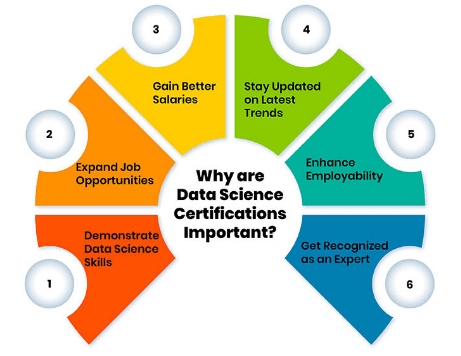
Syllabus Overview
Although the syllabus may vary between different data science certification programs, most cover a core set of essential modules designed to build a strong foundation in data science principles and practical skills. The curriculum typically begins with an introduction to data science and analytics, providing an overview of the field’s scope, key concepts, and real-world applications. Programming is a fundamental component, with most courses focusing on Python or R as the primary languages due to their extensive libraries and community support. Mathematics and statistics form another critical module, covering topics such as probability, linear algebra, and statistical inference that underpin data analysis and machine learning algorithms. Following this, students learn data collection and preprocessing techniques, which include methods for gathering data from various sources and cleaning it to ensure accuracy and consistency, laying a strong foundation for Python Career Opportunities. Exploratory Data Analysis (EDA) is emphasized to help learners discover patterns, spot anomalies, and summarize key characteristics of datasets through statistical graphics and visualization tools. Machine learning fundamentals introduce various supervised and unsupervised algorithms, enabling participants to build predictive and classification models. Model building and evaluation modules teach techniques to train models effectively and assess their performance using appropriate metrics. Data visualization techniques are covered to equip learners with the skills to create compelling and informative charts and dashboards. Many programs also include modules on big data technologies, preparing learners to work with large-scale datasets using tools like Hadoop or Spark. Finally, capstone projects or case studies provide hands-on experience by allowing learners to apply their theoretical knowledge to real-world data problems, demonstrating their ability to extract insights and communicate findings effectively.
Want to Pursue a Data Science Master’s Degree? Enroll For Data Science Masters Course Today!
Certification vs Degree: Which is Better?
Online vs Offline Certification
Data science certifications can be pursued through both online and offline formats, each offering distinct advantages that cater to different learning preferences and needs. Online certifications have grown significantly in popularity, especially after the pandemic, due to their convenience and accessibility. Learners from anywhere in the world can enroll in these courses without the need to relocate, making education more inclusive. Online programs often provide flexible scheduling and self-paced learning, allowing individuals to balance their studies with work or personal commitments. Additionally, online certifications tend to be more cost-effective since they eliminate expenses related to commuting, accommodation, and physical materials. Leading platforms such as Coursera, edX, and Udacity collaborate with top universities and industry leaders to offer high-quality, industry-relevant courses online, including topics like Machine Learning Vs Deep Learning. On the other hand, offline certifications provide a more structured learning environment with face-to-face interaction between instructors and peers. This direct engagement can enhance understanding through immediate doubt resolution, personalized feedback, and collaborative learning experiences. Classroom settings encourage networking and build a sense of community among participants, which can be valuable for career growth. For learners who thrive on routine and direct supervision, offline courses may offer better motivation and focus. Ultimately, the choice between online and offline certification depends on individual circumstances, learning styles, and professional goals. While online certifications offer unparalleled flexibility and accessibility, offline programs excel in fostering engagement and real-time support. Both paths provide credible opportunities to develop data science skills and boost career prospects in a rapidly evolving field.
Go Through These Data Science Interview Questions & Answer to Excel in Your Upcoming Interview.
Job Opportunities After Certification
Earning a data science certification opens the door to a wide range of promising career opportunities across various industries. Certified professionals are equipped with validated skills in data analysis, machine learning, programming, and visualization, making them highly attractive to employers. Popular job roles include Data Analyst, where individuals interpret and analyze data to help organizations make informed decisions. Data Scientists build predictive models and extract insights from complex datasets, often using advanced machine learning techniques. Machine Learning Engineers focus on designing and deploying scalable machine learning systems that can automate decision-making processes. Business Intelligence Analysts leverage data to develop reports and dashboards that track performance metrics, helping businesses optimize operations, a skill often honed through Business Intelligence Analysts leverage data to develop reports and dashboards that track performance metrics, helping businesses optimize operations, a skill often honed through Data Science Training. Data Engineers play a critical role in designing, building, and maintaining the infrastructure needed for large-scale data processing and storage. AI/ML Researchers work on cutting-edge artificial intelligence projects, advancing algorithms and models. Statisticians apply mathematical and statistical techniques to interpret data and solve real-world problems, while Data Consultants provide expert advice to organizations looking to implement data-driven strategies. The demand for skilled data professionals spans industries such as finance, healthcare, e-commerce, logistics, marketing, and more. With the explosion of data generated daily, businesses are eager to hire certified candidates who bring both theoretical knowledge and practical project experience. Certifications help professionals stand out in a competitive job market by demonstrating commitment, expertise, and the ability to deliver results. As data-driven decision-making becomes integral to business success, those holding recognized data science certifications are well-positioned to build rewarding careers with significant growth potential.


